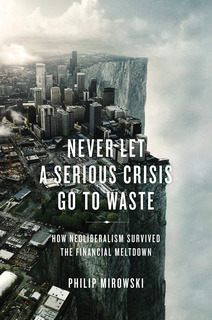Philip Mirowski over het tweede zombieleven van het neoliberalisme
De Amerikaanse economische historicus Philip Mirowski heeft zojuist een dikke pil gepubliceerd dat het antwoord geeft op de vraag hoe de neoliberalen de crisis niet alleen te boven zijn gekomen, maar zelfs sterker zijn geworden. Aanvankelijk dachten we immers dat ze die niet eens zouden overleven. Als iets het grote ongelijk van het geloof in ‘alle macht aan de vrije markt’ aantoonde, was het immers wel de economische ineenstorting die volgde op het omvallen van Bear Stearn’s hedgefunds, en vooral van de Lehmann Bank in september 2008. Maar ondertussen zitten we nog steeds in een vette crisis, terwijl de schulden niet meer bij de banken, maar bij de overheden zitten, die vervolgens als windvangers voor het bedrijfsleven dienen. Hoe dat zo gekomen is, en wat de gevolgen zijn, vertelt Mirowski in Never Let A Serious Crisis Go To Waste.

Of zoals hij het zelf omschrijft: “After the financial apocalypse, neoliberalism rose from the dead—stronger than ever”.
Vanwege de omvang van het boekwerk, heb ik besloten die langzaam per hoofdstuk voor u te gaan recenseren/samenvatten. Binnenkort in zes delen op deze website dus. In de tussentijd hieronder de Engelstalige beschrijving van de uitgever. En een link naar een apart stuk van de auteur, The Thirteen Commandments of Neoliberalism
Van de website van Verso, de uitgever van het boek:
At the onset of the Great Recession, as house prices sank and joblessness soared, many commentators concluded that the economic convictions behind the disaster would now be consigned to history. And yet, in the harsh light of a new day, we’ve awoken to a second nightmare more ghastly than the first: a political class still blaming government intervention, a global drive for austerity, stagflation, and an international sovereign debt crisis.
Philip Mirowski finds an apt comparison to this situation in classic studies of cognitive dissonance. He concludes that neoliberal thought has become so pervasive that any countervailing evidence serves only to further convince disciples of its ultimate truth. Once neoliberalism became a Theory of Everything, providing a revolutionary account of self, knowledge, information, markets, and government, it could no longer be falsified by anything as trifling as data from the “real” economy.
In this sharp, witty and deeply informed account, Mirowski—taking no prisoners in his pursuit of “zombie” economists—surveys the wreckage of what passes for economic thought, finally providing the basis for an anti-neoliberal assessment of the current crisis and our future prospects.
Hardback, 384 pages
ISBN: 9781781680797
July 2013
$29.95 / £20.00 / $34.95CAN
Other Editions
Ebook, 384 pages
ISBN: 9781781683033
July 2013
$14.99 / $31.50CAN